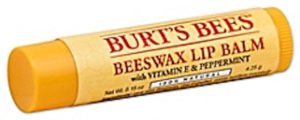
From the Editor
The PRP Survival Guide is a repository of experiences and insights shared by PRP patients and their caregivers. Collectively, the PRP community possesses a wealth of practical knowledge about pityriasis rubra pilaris. We need to harvest that knowledge for those in need of enlightenment. The image of a desert seemed appropriate for an ongoing discussion of DRY lips.
 Like many PRP patients my lips took a beating. I’m not sure what I put on them to reduce the dryness and cracking. One day a fellow PRP patient described the condition of their lips and recommended Burt’s Bees, Beeswax Lip Balm. I had never heard of it. I think I thought it was one of those products they have in England.
Like many PRP patients my lips took a beating. I’m not sure what I put on them to reduce the dryness and cracking. One day a fellow PRP patient described the condition of their lips and recommended Burt’s Bees, Beeswax Lip Balm. I had never heard of it. I think I thought it was one of those products they have in England.
I went to my nearby CVS Pharmacy and there it was – a GIANT Burt’s Bees display. Duh. Got a three-pack and my lips were never dry and cracked again.
I’m sure there are other great products for lip care and I am not endorsing Burt’s Bees. What I am endorsing is that PRP patients with dry and/or cracked lips to “pucker up” and do something.
What can cause dry lips?
Weather conditions
The properties of lip skin are such that it loses moisture 3-10 times faster than any other part of your body. Weather conditions are the most common cause of dry lips. The arid climate, dry winter air, frequent exposure to summer sun; all of these can cause your lips to lose moisture very quickly.
Too much Vitamin A
On the flip side, dry lips can mean you’re intaking too much vitamin A. Vitamin A toxicity can occur if you’re taking too many supplements – you should be careful in taking vitamin A supplements because most of it should come from your diet. If you have too much vitamin A in your system, your skin and lips can begin to peel and crack.
Dehydration
Dry lips, mouth, and eyes are all signs of dehydration. To avoid dehydration, it’s recommended that you drink eight to twelve glasses of water a day. If you’re diabetic or an athlete, drink even more! Dehydration upsets the natural balance of minerals in our bodies, wreaking havoc on our skin.
Allergic Reaction
If you’re taking medication for hypothyroidism, acne, or high blood pressure, you could be having an allergic reaction to these medications, causing your lips to dry out and puff up. Consult your doctor if you think this is the reason behind your dry lips.

In response to a post from Maya M on October 18, 2020
Carol Terry – Swaffham, Norfolk, England
Laurence G – Anglet, France
Fran M – Colorado, USA
Colleen J – Edmonton, Alberta, Canada
Jarin J – Goodlettsville, Tennessee, USA
Azucena R – California, USA
Chris N– Hockley, England
Leith W– Toowoomba, Queensland, Australia
Nita P– Fultonham, Ohio, USA
Cheryl H– Claremore, Oklahoma
Nicole E – Orange County, California
Mark A– Medford, Massachusetts

